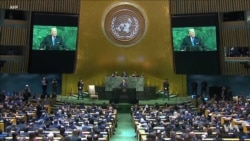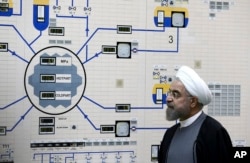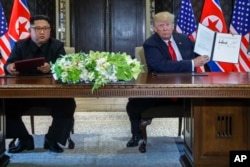U.S. President Donald Trump returns to the United Nations on Monday for the annual gathering of world leaders. After an international debut last year in which he threatened to “totally destroy” North Korea, many are anxious about what message he may bring this year to the U.N. General Assembly.
Since last September’s war of words with North Korean leader Kim Jong Un — during which Trump memorably called Kim “Rocket Man” and Kim responded from Pyongyang, calling Trump a “dotard” — tensions have cooled dramatically and the two leaders have met amid much fanfare to discuss North Korea’s denuclearization.
This year, however, Iran looks to be in Trump’s sights, with members of his administration ramping up the rhetoric ahead of the General Assembly.
Tough talk
U.S. Secretary of State Mike Pompeo told Fox News on Wednesday that the Trump administration was “working to get Iran to behave like a normal nation” and “stop being the world’s largest state sponsor of terror.”
U.N. Ambassador Nikki Haley regularly castigates Tehran for its destabilizing role in Syria and Yemen and its support for militant groups Hamas and Hezbollah.
“Iran continues to be a problem,” Haley told reporters Thursday. “Every dangerous spot in the world, Iran seems to have their fingerprints in it.”
Earlier this year, Trump announced the United States was withdrawing from the Obama-era 2015 deal to end Iran’s nuclear weapons program and reimposing unilateral sanctions on Tehran. In November, companies doing business with Iran will have to stop or risk being shut out of the U.S. financial system. Washington wants to pressure Tehran back to the negotiating table for a new, broader deal.
Trump will most likely fault Tehran for its destabilizing behavior in the region and disparage the nuclear deal when he addresses the General Assembly early Tuesday. Experts warn the U.S. might find itself somewhat isolated at the gathering.
“The problem for the Trump administration is that many of the U.S.’s allies, including the powers which are signatories to the Iran nuclear deal, they will not join such condemnation,” noted the Middle East Institute’s Ahmad Majidyar. “While these countries share Washington’s concerns about Iran’s controversial ballistic missile program or support for some terrorist and militant groups in the region, they strongly support the nuclear deal and they do not back Washington’s unilateral exit.”
The United States also happens to hold the rotating presidency of the U.N. Security Council this month and is using the opportunity for Trump to chair a meeting Wednesday on nonproliferation. Expect him to talk a lot about Iran.
“I am sure that will be the most-watched Security Council meeting ever,” Haley said in a nod to her boss’s love of good television ratings.
The president took to his favorite communications medium on Friday morning to promote the session, tweeting, “I will Chair the United Nations Security Council meeting on Iran next week!”
Likely by Trump's side will be his national security adviser and a former Bush-era U.N. ambassador, John Bolton, who is known for his hard-line views on Iran and his disdain for the United Nations.
“Bolton understands how the U.N. works better than others,” Majidyar said. “He would try to shape the discussion at the U.N. on Iran and also try to use both carrot and stick with its allies to gain their support when it comes to Iran.”
While Iranian President Hassan Rouhani will also be at next week's General Assembly, a meeting between the two leaders is highly unlikely. But expect Rouhani to counter any criticism from Trump during his own address to the assembly hours after Trump's speech, and at a news conference on Wednesday.
Talks with North Korea
Denuclearization talks with North Korea will also dominate the week.
The leaders of North and South Korea this week wrapped a three-day summit in Pyongyang and signed a series of agreements, as relations between the two countries continue to improve. But talks between the U.S. and North Korea have stalled since the June Trump-Kim summit in Singapore.
Kim has never attended the General Assembly and will not this year, but Trump will meet Monday with South Korean President Moon Jae-in for a debriefing on the Pyongyang summit.
Pompeo has also invited his North Korean counterpart to meet him in New York.
"This will mark the beginning of negotiations to transform U.S.-DPRK relations through the process of rapid denuclearization of North Korea, to be completed by January 2021,” Pompeo said in a statement Wednesday, setting out a timeline for completing Pyongyang’s denuclearization.
Pompeo also plans to chair a ministerial-level meeting of the U.N. Security Council on Thursday to discuss North Korea.
“It’s a chance for us to look at what we’ve achieved in progress on North Korea,” Haley told reporters this week. “It’s a chance to look at the commitment we want on peace. But it’s also a chance to have the conversation that if we don’t enforce the sanctions, all of this can go away.”
Multilateralism in peril?
In the year since he made his U.N. debut, Trump has cut funding to the world organization, withdrawn from the Paris Climate Agreement and the Iran nuclear deal, and quit U.N. bodies, including the Human Rights Council. He has also had difficult outings at gatherings of G-7 leaders and NATO.
“I think that a lot of leaders are going to be pretty cautious with President Trump,” said Richard Gowan, senior fellow at the U.N. University Centre for Policy Research. “The Europeans have been quite burned at a number of recent summits.”
Without naming names, U.N. Secretary-General Antonio Guterres recently told reporters that “multilateralism is under attack from many different directions precisely when we need it most.” He said he would use his meetings to press for a renewed commitment to a “rules-based global order and to the United Nations.”













